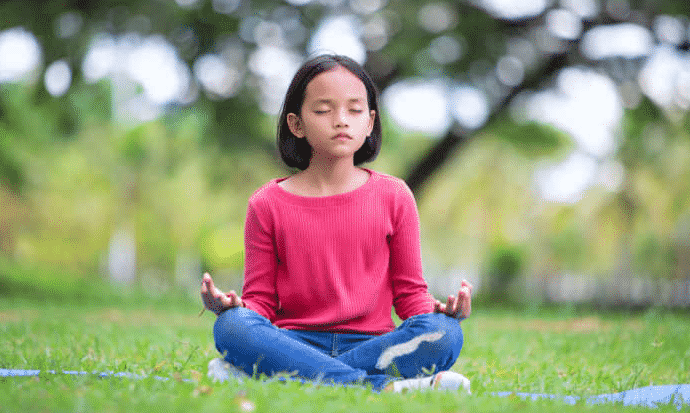Ultimate Breast Cancer Awareness Guide: Knowledge, Early Detection, and the
Breast cancer is not a death sentence when caught early. It’s a battle that can be won with awareness, courage, and timely action.


Excerpted from When Women Rise: Everyday Practices to Strengthen Your Mind, Body, and Soul by Dr. Michele Kambolis
By learning to observe the changing nature of our mind and body we have the potential to gain a profound and life-changing self-knowledge, a deep inner knowing that can lead to enduring peace. Is facing the unruly mind sometimes daunting? Yes. But in time we begin to see the impermanent flow of thought, emotion, sensation, and the unfolding of our lives with greater compassion and a little more humor. We tend to take our human predicament very seriously at times!
Most of the time we’re asleep at the wheel, but meditation gives us a chance to free the mind from the unconscious conditions that remove us from the present moment. The longer we sit in stillness and silence, using these ancient and codified systems of training the mind, the more proficient we become at meeting life exactly where it is. Between surges of discomfort emerge moments when thoughts are transcended, the mind recedes, and we begin to discover the magic of unbroken awareness. The present becomes expansive. We feel an inner spaciousness more often, and from that spaciousness comes a natural radiance of joy and goodness. Every time we meditate, we have the potential to open a gateway to the awe and wonder of life itself, to embrace all of it.

Meditation isn’t about making ourselves different or better—there is no improving the perfect essence of who we are already. It’s about being the fullest version of ourselves. Bringing a wakefulness and kindness to our relationship with ourselves is a beautiful thing. I believe that if each of us chooses to sit in quiet contemplation each day, every day, we have the capacity not only to awaken to our true selves but also to elevate the wakefulness required to support our planet’s survival.
Meditation is an ongoing process of ever-increasing awareness, and what we practice on the mat prepares us to face our lives with greater wisdom. And what we repeat, we embody. Meditation primes the brain for calm, focused awareness and the heart for compassion beyond measure. It changes first our state (the heart rate decreases, feelings of restful alertness increase, and the thinking mind settles) and then our enduring traits (improved resiliency to stress, greater compassion for ourselves and others, better focused attention and we become less self-absorbed).1 It is a training ground for a kinder, wiser way.
While meditation allows us to open up, that doesn’t mean that when we sit, close our eyes, and turn inward, we always find bliss. The discomfort and steady stream of thoughts don’t magically go away. Meditation shows us exactly where we’re opening up or shutting down, trying to escape or leaning in. There’s no running away. Meditation is a mirror with acute accuracy, and no matter how the mirror is angled, we see ourselves exactly as we are. We come face-to-face with our disappointment, anger, sadness, resentment, pain, and anxiety. We see clearly all the ways we manipulate the moment, amplifying, avoiding, or entertaining ourselves with fantasies and wishes. Meditation teaches us to stop struggling and soften into ourselves.
The effects of meditation are gradual and cumulative. The neurobiological changes that occur with every minute of contemplative practice make it one of the most potent and trusted ways to expand well-being. A research group at Johns Hopkins University reviewed almost 19,000 meditation studies and included forty-seven randomized clinical trials.2 They found that regular meditation had an overwhelming ability to quell anxiety and relieve symptoms of depression and pain (among many other benefits).
Not all meditation approaches are alike, however. Contemplative practices, for example, are a training ground, a mental gym where we can exercise the parts of the brain that help regulate the thoughts and emotions that pull us out of the moment.3 And if we want to strengthen our emotional stability, self-awareness, and focused attention (who doesn’t?!), then contemplative meditation may be the answer.4 For greater self-compassion, connection, or altruism, Metta meditation (also known as loving-kindness meditation) is well proven to get us there.5 Certain mindfulness practices have been shown to reduce pain and leave meditators less emotionally reactive to it when it arises.6

Although meditation has been a part of Eastern spiritual traditions for centuries, its primary purpose has never been to help us relax, improve our focus, or sleep better. Any benefits such as these are secondary to the true goal of developing a deep contemplative process and positive quality of being. As we’ve adapted meditation to Western culture, we have borrowed some traditions while leaving others behind. We have emphasized guided short-term practice in hopes of alleviating stress and other more immediate benefits. The kind of meditation I’m encouraging here is neither the deep path that comes with monastic dedication nor the user-friendly app-only version but something in between. And while your motivation for meditating may vacillate between the simple hope of feeling calmer and renewed and a deeper desire to discover true peace and freedom, know that the approach you use and the number of hours in practice matter if you’re looking for lifelong change.7
The science and data on meditation are starting to reveal what works for whom and why. Many neuroscientists, physicists, and psychologists have committed their professional lives to this understanding and they are just now discovering the payoffs meditation brings to our physical health, mental well-being, and social connections. Scientific scholars are confirming what wisdom teachers have suspected all along: meditation changes the architecture of the mind in ways that can transform our well-being. Meditation may seem mystical since it was born from spiritual tradition, but the practice is a secular endeavor and its effectiveness borne out by rigorous scientific studies. Meditation is available to everyone, anywhere, any time.
Still thinking of meditation as just a way to unwind after a long day? The benefits of meditation extend far beyond relaxation. Here are just some of the ways that meditation has been shown to support well-being:
1. Meditation helps to reduce symptoms of attention-deficit/hyperactivity disorder (ADHD). It’s no surprise that meditation helps us focus, but we now know that it actually helps adults and adolescents with ADHD. In a 2008 study published in the Journal of Attention Disorders, 78% of participants reported a reduction in their symptoms after meditation.8
2. In patients with heart disease, meditation reduces the risk of heart attack and stroke. Patients who meditated for 20 minutes a day were less stressed and experienced a reduced risk of “endpoint cardiovascular events” as compared to a control group that did not meditate.9
3. Meditation increases social connection and emotional intelligence. A study showed that by increasing positive emotions, meditation produced feelings of increased purpose in life and social support, which led to an increase in life satisfaction and reduced depressive symptoms.10
4. Even a brief meditation session helps to improve our working memory and reduces fatigue. It’s well established that meditating for longer periods of time produces cognitive benefits, but we now know that as few as 4 brief meditation sessions can improve mood and working memory.11
5. Meditation can improve analytical and problem-solving abilities. A 2015 study published in Frontiers of Psychology showed that mindful participants performed better when instructed to solve problems analytically than a control group made up of less mindful participants.12
6. Meditation enhances our creativity. Even for beginners, studies show that meditation techniques improve creative thinking abilities and have lasting cognitive benefits.13
7. Meditation can improve our sex life. In a 2011 study, women who meditated were more able to register and attend to their own physiological responses to sexual stimuli, improving their libido and reducing symptoms of sexual dysfunction.14
8. Meditation may make our brain bigger and mitigate the effects of aging. In one study, the brain scans of long-term meditators showed thicker gray matter, even in older individuals, compared to non-meditators. The study’s findings suggest that meditation improves cortical thickening and plasticity in the areas of the brain related to cognitive and emotional processing and well-being.15
Excerpted from When Women Rise: Everyday Practices to Strengthen Your Mind, Body, and Soul by Dr. Michele Kambolis. Copyright © 2021 by Dawn Michele Hucul-Kambolis. Excerpted with permission from Figure 1 Publishing. All rights reserved. No part of this excerpt may be reproduced or reprinted without permission in writing from the publisher.
Breast cancer is not a death sentence when caught early. It’s a battle that can be won with awareness, courage, and timely action.

Being the parent of an autistic child comes with additional challenges. These parents carry many unseen and unacknowledged responsibilities.

Kids in British Columbia are set to benefit from an expanded school food program that will reach 90,000 students in more than 1,000 schools this school year.
